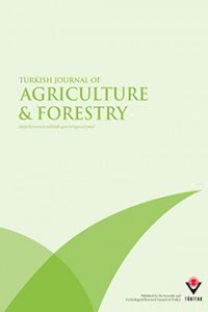The Effect of Tobacco Waste Application on the Physical and Chemical Properties of Alkaline Soils
This study was conducted to (i) determine the effect of tobacco waste application on the soil structure stability (SS), hydraulic conductivity (HC), bulk density, exchangeable sodium percentage (ESP), sodium adsorption ratio (SAR), and electrolyte concentration of alkaline soils, and (ii) observe the possibility of using tobacco waste for the reclamation of alkaline soils. The study was designed in randomized complete blocks with three replications and tobacco waste was applied at a rate of 0, 0.5, 1.5, 2.0 ton/ha to each block. The hydraulic conductivity and structure stability of the alkaline soils studied were substantially improved with increased rates of tobacco waste application. Bulk density, ESP and SAR were reduced with the same application. Although the reduction in ESP values was not statistically significant (P < 0.05), SAR values were significant (P < 0.05). Similarly, tobacco waste application decreased the pH (P < 0.01) and exchangeable Na (P < 0.05); however, soil electrical conductivity (P < 0.01), CaCO3 (P < 0.05), exchangeable Ca and Mg (P < 0.05) and organic matter content (P < 0.05) were increased. Statistical analyses of soil testing data after the application of tobacco waste revealed that SAR values were significantly correlated with SS and HC values. Tobacco waste enhanced the physical and chemical conditions, and increased the agricultural potential of the alkaline soils. Therefore, tobacco waste can be recommended for use on deserted alkaline agricultural fields.
Anahtar Kelimeler:
Tobacco waste, exchangeable sodium percentage, sodium adsorption ratio, hydraulic conductivity, structure.
The Effect of Tobacco Waste Application on the Physical and Chemical Properties of Alkaline Soils
This study was conducted to (i) determine the effect of tobacco waste application on the soil structure stability (SS), hydraulic conductivity (HC), bulk density, exchangeable sodium percentage (ESP), sodium adsorption ratio (SAR), and electrolyte concentration of alkaline soils, and (ii) observe the possibility of using tobacco waste for the reclamation of alkaline soils. The study was designed in randomized complete blocks with three replications and tobacco waste was applied at a rate of 0, 0.5, 1.5, 2.0 ton/ha to each block. The hydraulic conductivity and structure stability of the alkaline soils studied were substantially improved with increased rates of tobacco waste application. Bulk density, ESP and SAR were reduced with the same application. Although the reduction in ESP values was not statistically significant (P < 0.05), SAR values were significant (P < 0.05). Similarly, tobacco waste application decreased the pH (P < 0.01) and exchangeable Na (P < 0.05); however, soil electrical conductivity (P < 0.01), CaCO3 (P < 0.05), exchangeable Ca and Mg (P < 0.05) and organic matter content (P < 0.05) were increased. Statistical analyses of soil testing data after the application of tobacco waste revealed that SAR values were significantly correlated with SS and HC values. Tobacco waste enhanced the physical and chemical conditions, and increased the agricultural potential of the alkaline soils. Therefore, tobacco waste can be recommended for use on deserted alkaline agricultural fields.
Keywords:
Tobacco waste, exchangeable sodium percentage, sodium adsorption ratio, hydraulic conductivity, structure.,
- ISSN: 1300-011X
- Yayın Aralığı: Yılda 6 Sayı
- Yayıncı: TÜBİTAK
Sayıdaki Diğer Makaleler
Senih YAZGAN, Hasan DEĞİRMENCİ
Nuray KIZILASLAN, Sevilay ALMUS
Senih YAZGAN, Hasan DEĞİRMENCİ
Effects of Pruning Treatments on the Yield and Fruit Quality of Precoce de Tyrinthe Apricot Cultivar
The Effect of Tobacco Waste Application on the Physical and Chemical Properties of Alkaline Soils
